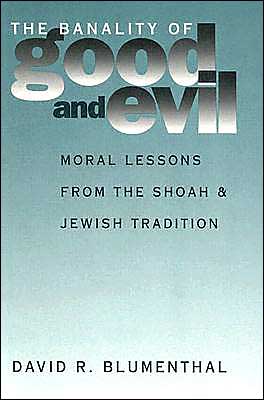Banality of Good and Evil: Moral Lessons from the Shoah and Jewish Tradition
People who helped exterminate Jews during the shoah (Hebrew for "holocaust") often claimed that they only did what was expected of them. Intrigued by hearing the same response from individuals who rescued Jews, David R. Blumenthal proposes that the notion of ordinariness used to characterize nazi evil is equally applicable to goodness. In this provocative book, Blumenthal develops a new theory of human behavior that identifies the social and psychological factors that foster both good and...
Search in google:
People who helped exterminate Jews during the shoah (Hebrew for "holocaust") often claimed that they only did what was expected of them. Intrigued by hearing the same response from individuals who rescued Jews, David R. Blumenthal proposes that the notion of ordinariness used to characterize nazi evil is equally applicable to goodness. In this provocative book, Blumenthal develops a new theory of human behavior that identifies the social and psychological factors that foster both good and evil behavior. Drawing on lessons primarily from the shoah but also from well-known obedience and altruism experiments, My Lai, and the civil rights movement, Blumenthal deftly interweaves insights from psychology, history, and social theory to create a new way of looking at human behavior. Blumenthal identifies the factors—social hierarchy, education, and childhood discipline—that shape both good and evil attitudes and actions. Considering how our religious and educational institutions might do a better job of encouraging goodness and discouraging evil, he then makes specific recommendations for cultivating goodness in people, stressing the importance of the social context of education. He reinforces his ideas through stories, teachings, and case histories from the Jewish tradition that convey important lessons in resistance and goodness. Appendices include the ethical code of the Israel Defense Forces, material on non-violence from the Martin Luther King, Jr., Center, a suggested syllabus for a Jewish elementary school, and a list of prosocial sources on the Web, as well as a complete bibliography. If people can commit acts of evil without thinking, why can't even more commit acts of kindness? Writing with power and insight, Blumenthal shows readers of all faiths how we might replace patterns of evil with empathy, justice, and caring, and through a renewed attention to moral education, perhaps prevent future shoahs. About the Author: David R. Blumenthal is Jay and Leslie Cohen Professor of Judaic Studies in the Department of Religion at Emory University. Among his numerous other books are God at the Center (Harper & Row, 1988/Jason Aronson, 1994) and Facing the Abusing God: A Theology of Protest (Westminster/John Knox, 1993). Booknews Drawing from his course, "The Problem of Evil: A Social Psychological Approach" at Emory University, Blumenthal combines Jewish tradition with insights from the social sciences to analyze the contrasting extremes of human behavior towards others. Then he discusses how to apply the analysis to the moral education of young children, describing methods and approaches that can be used in civil society as well as in faith-based institutions. Paper edition (unseen), $23.95. Annotation c. Book News, Inc., Portland, OR (booknew.com)
Foreword1Roadmap1Pt. 1The Descriptive-Analytic Task172The Field193Hierarchy and Role354Teaching and Praxis585Childhood Discipline and Personality84Pt. 2The Prescriptive-Normative Task1036Transition1057The Affections and Value-Concepts of the Prosocial Life1158Do This126Pt. 3The Voice of Jewish Tradition1419The Tradition and the Problem14310Some Jewish Prosocial Value-Concepts14911Stories of Resistance and Goodness16812Teachings of Resistance and Goodness18213Four Case Studies19614Hierarchy, Authority, and Autonomy in Teaching Judaism221Aftermatter229App. AThe New Ethical Code of the IDF231App. BThe Ten Commandments of the Solomon Schechter Day School Community239App. CThe 198 Methods of Nonviolent Action (The Einstein Institute)241App. DSix Steps for Nonviolent Social Change (The King Center)245App. ESix Principles of Nonviolence (The King Center)247App. FList of Prosocial Resources on the Web249App. GSyllabus for "The Problem of Evil"252App. HSocial Action Rabbinics Curriculum: Na'aseh ve-Nishma'256App. IIntroduction to Holocaust and Human Behavior262Notes265Selected Bibliography307Glossary315Subject Index317Source Index321
\ BooknewsDrawing from his course, "The Problem of Evil: A Social Psychological Approach" at Emory University, Blumenthal combines Jewish tradition with insights from the social sciences to analyze the contrasting extremes of human behavior towards others. Then he discusses how to apply the analysis to the moral education of young children, describing methods and approaches that can be used in civil society as well as in faith-based institutions. Paper edition (unseen), $23.95. Annotation c. Book News, Inc., Portland, OR (booknew.com)\ \








